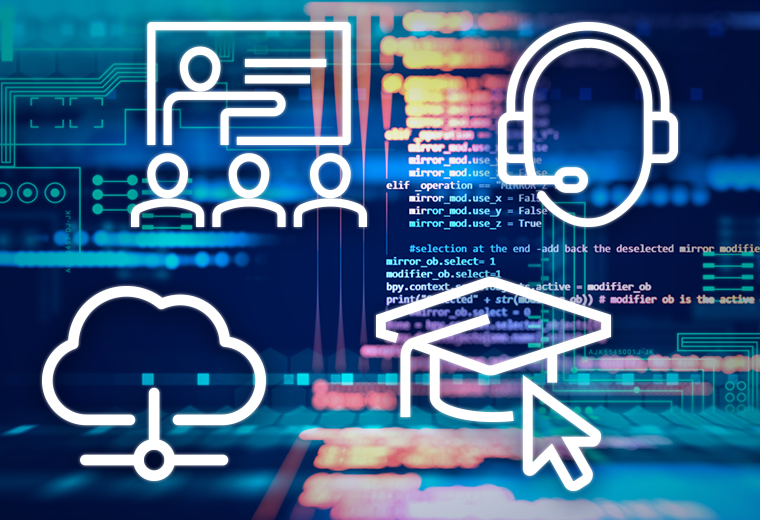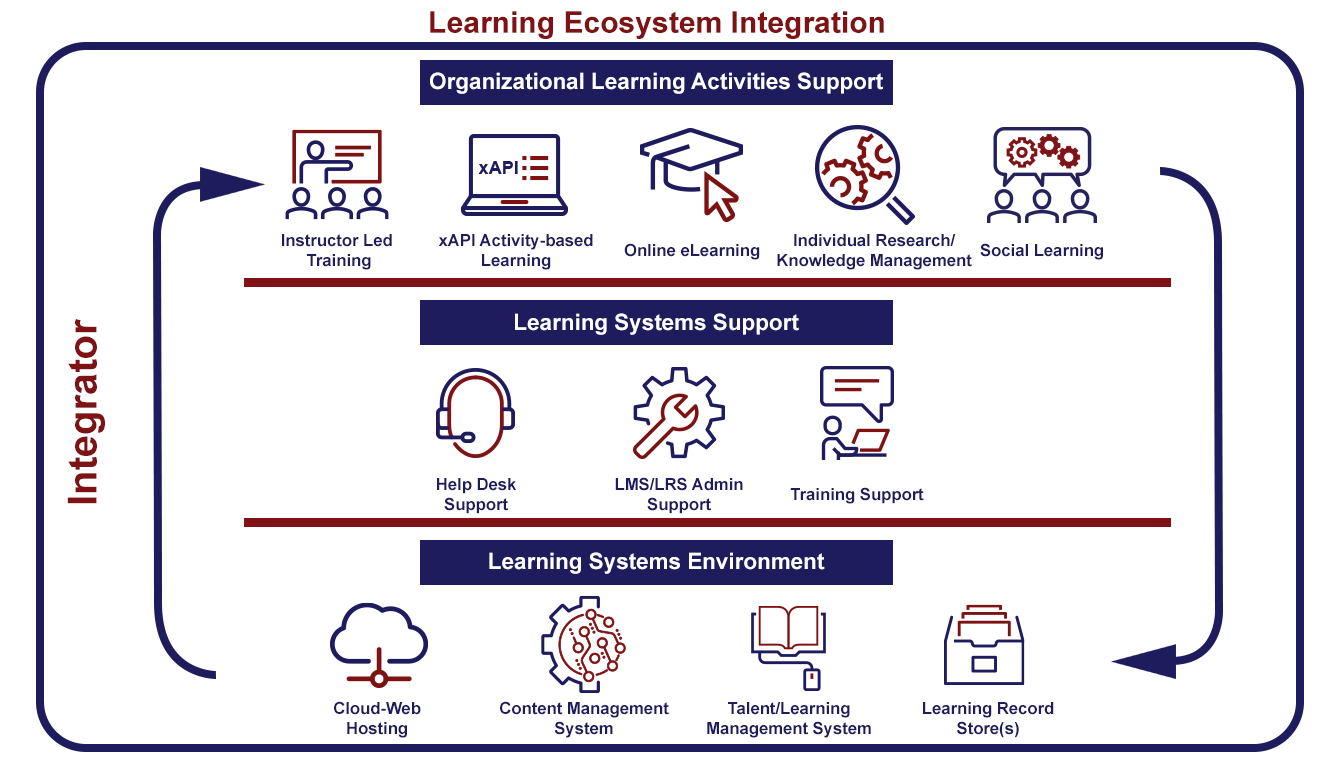USALearning will provide state-of-the-art learning ecosystem support for your government organization.
This functional service includes design, develop, and implement learning ecosystem support for agency customers based on requirements. These learning systems integrate with the customer learning and performance ecosystem and may include Learning Management Systems (LMS), LRS, learning content management systems, knowledge management systems, learning portals, hosting, cybersecurity support, help desk and or other associated support. These utilize data, AI, or applications to engage with the organization’s management, delivery, tracking and engagement of the learning audience. These learning ecosystems may be contracted as separate deliverables, together as a package, or as an integration with existing systems, such as human resource information systems.
Read more about Learning Ecosystem Support services from USALearning below.

- Consultation Services for agency/services looking for a new or replacement LMS & evaluation of the optimal solution based upon requirements, such as number of users, courses, and type(s) of primary usage
- Recommending and planning of LMS solutions, including risk management plan, schedule of sprints, milestone completions, quality management and test plan, Contractor staffing plan and cost estimates
- Support and/or establishing the agency-unique learning delivery and LMS site adapted to agency requirements
- Integration or sharing LMS data with HRIS and learner workflow/activity management systems such as LRS and workflow performance delivery and tracking systems via xAPI or local applications for learning interface
- Provide Federal Risk and Authorization Management Program (FedRAMP) LMS FISMA support for system operations within the organization. Assist organizations with Authority to Operate (ATO) and cybersecurity controls and monitoring
- Conduct continuous monitoring– All accredited systems are required to monitor a selected set of security controls and the system documentation shall be updated to reflect changes and modifications to the system. Continuous monitoring activities include configuration management and control of information system components, security impact analyses of changes to the system, ongoing assessment of security controls, and status reporting
- Provide reports to CIO of customer agency as needed
- Implementation of custom workflow based upon evaluation of customer organizational requirements. Customization services as needed for integration into the customer LPE and defined workflow
- Migration/loading historical training completions, users, and courses for existing LMS/HRIS systems into new LMS implementation
- Creation of activity based or on the job performance-based learning applications
- Provide real-time dashboards to show real time learner engagement, completions, results, and historical data comparisons
- Reports – user, completions, course, exams and other activities as required
- Training for organization as needed for various LMS roles
- On or off-support as needed for LMS administration
- Evaluation of the optimal LRS solution
- Establishing the agency unique LRS site customized to agency metadata requirements
- Implementation of custom activity workflows
- Integration with applications (e.g. LMS, LCMS, Human Resources (HR) systems such as USA Suite/Service)
- Creation and management of real-time personalized learning dashboard consisting of three (3) level views (e.g., OMB, agency CLO, and allowing every individual user individual access to personal Career Management Account). Data and dashboard information shall be transferable for every employee from agency to agency and feed into the new Digital Employee Record using the latest in security such as Blockchain for tracking, validation, and protection of those records
- Learning Content (Authoring Tools) Development Tools
- Learning & Performance Ecosystems
- Learning Record Stores, in conjunction with xAPI enable learning activities designed to enhance human performance
- Data derived from these experiences enables visualization of the benefits or success of these experiences- which combined with artificial intelligence these can provide personalized or prescriptive learning based upon the learner’s knowledge, skills, or interest in progressing from basic to advanced skill levels
- Learner driven interfaces and portals to support
- Social learning and collaboration through Government-controlled environments which connect learners with experts, peer and professional groups focus on professional interests or common learning experiences
- Knowledge management integrated learning environments enable community and expert knowledge contributions and advanced search capabilities for finding topics and information by individuals as well as for facilitated learning and development of advanced learning content
- Learning environments provide “untethered” learning opportunities via mobile applications, learning performance applications, workflow learning integrations and integrated data dashboards for integration of these learner-centric environments with organizational needs and data collection of learner activities as proof of value modalities
- Provide high-speed high-availability hosting services running in a shared or dedicated server with the entire infrastructure
- Back-up, and monitoring, maintenance and patching applications
- Provide government cloud, FedRAMP approved hosting capabilities
- Cloud Computing environments to include:
- Cloud Software as a Service (SaaS). The capability provided to the consumer is to use the provider’s applications running on a cloud infrastructure. The applications are accessible from various client devices through a thin client interface such as a Web browser (e.g., Web-based email), or a program interface. The consumer does not manage or control the underlying cloud infrastructure including network, servers, operating systems, storage, or even individual application capabilities, with the possible exception of limited user-specific application configuration settings
- Cloud Platform as a Service (PaaS). The capability provided to the consumer is to deploy onto the cloud infrastructure consumer-created or -acquired applications created using programming languages and tools supported by the provider. The consumer does not manage or control the underlying cloud infrastructure including network, servers, operating systems, or storage, but has control over the deployed applications and possibly application hosting environment configurations
-
- Automatic on-site and off-site back-up each day to a revolving series of back-up files to provide daily back- ups, a single weekly and a monthly back-up
- Provide redundant internet service providers, back-up power generator, and 24-hour access and security
- FedRAMP and FedRAMP+ Certification Required (FedRAMP Federal Moderate and High; DoD Impact Level IV and FedRAMP+), (SaaS, IaaS, PaaS)
- Provide and maintain a host test/staging environment (non-FedRAMP)
- Phone support: The Contractor shall provide Toll-free number(s) as well as a local Washington DC number. The phone support hours shall accommodate agency specific needs. The Contractor shall provide and manage voicemail box and respond to all messages the next business day before noon.
- Automated system for help desk tickets submission, tracking and resolution
- Help desk support includes assistance with registration, log in, password resets, sending lost passwords to users, troubleshooting course access, navigation, appropriate procedures to follow, and fielding general questions regarding the course
- Providing real-time on-line dashboard that provides reports of numbers of help desk calls, issues, summary by issue, and detailed calls are available real-time to authorized personnel with the secure access
- Requirements management
- Interface Management
- Program Documentation
- Project Management
- Regulatory Compliance
- Cost/Schedule/Performance Analysis
- Technical Assessment
- Supply Chain Management
- Lifecycle logistics support
- Financial Management
- Assisting in researching and troubleshooting client agency issues with on-line content
- Section 508 of the Rehabilitation Act content testing and modification for compliance
- SCORM packaging, importing and exporting
- Administration and management functions for LMS, LRS, LCMS, on-line forums and other on-line knowledge management solutions
- Expert adviser and administrator for hosting, server, and registration to server as an expert resource
- Content management (e.g. maintenance, updates and distribution, etc.) archival and restoration
- Workflow management
- Database Administration and Data Storage Management
- Software Maintenance and Upgrades
- Data Quality Management
- Electronic Software Licensing Services including license: deployment, management, tracking, upgrading, etc.
- Maintaining and managing LMS, LRS, LCMS, on-line forums and other on-line knowledge management solutions
- Technical support both in person and escalated tier five support
- Systems for registering students for various courses
- Functionality for grading and documentation
- Transcripts, results of student tests and other assessment scores
- Set up of student schedules
- Tracking student attendance
- Management of other student-related data needs in a school
- *SIS should not be confused with a learning management system or virtual learning environment rather it’s an augmentation to the base LMS functionality. The SIS can include features that can be considered as an enterprise resource planning or ERP system for a client. As such, many of the issues with ERP system selection methodology, implementation, and operation of an ERP system may be applicable.
- Contractor shall provide integration services for installation, operation and maintenance of enterprise or other large learning data systems. Integration services should be capable of any or all functional requirements, however a typical integration project could consist of LMS/LRS installation and integration, associated software licensing for the cloud environment, cybersecurity, and technical support
- Integration services require a single integrator to oversee these complex projects and will require experienced management and staff. In these types of projects, the integrator is involved in all aspects of training systems planning, design, development implementation, and execution. Agile methodology for projects is required in most instances to ensure rapid development and continual testing
Enterprise learning systems and content software providers are key components for learning ecosystems. Whether you need a commercial learning management system (LMS) or a library of online learning with 1000s of titles, we provide a one-stop capability for government customers through the contracts we have in place. This potentially saves our customers of 100s of hours of market research and months of preparing new contract acquisition efforts. By doing so, our customers can focus on their training mission by not having to constantly focus on the laborious aspects of managing contracts.
Our acquisition service includes the installation operations and maintenance of commercial training, education and learning licenses for learning systems, authoring tools and content libraries and:
- Bulk purchasing of commercial content licenses for customer use
- Installation as required on customer LMS
- Updating of library content, as needed
- Helpdesk support for learning systems
- Technical support
